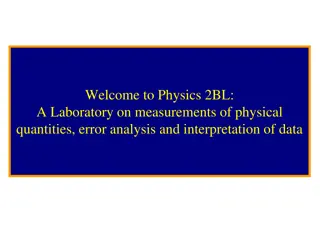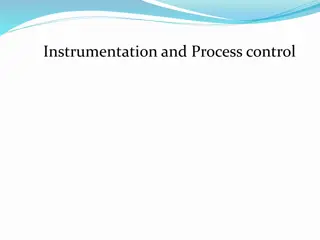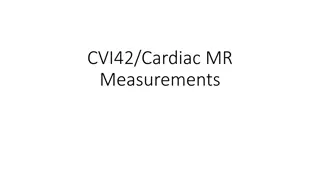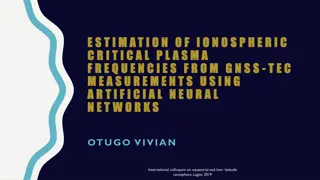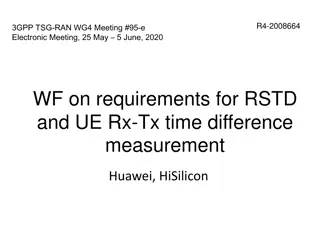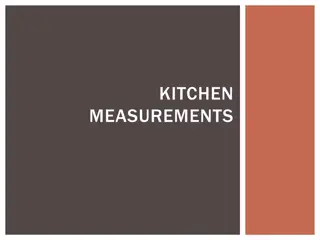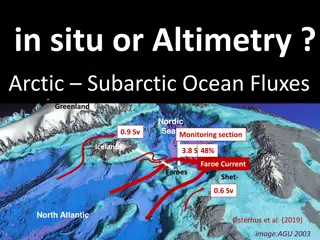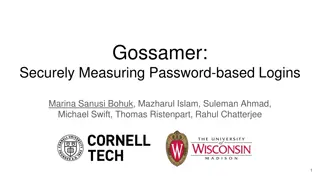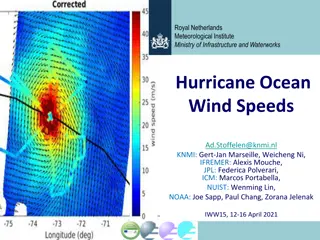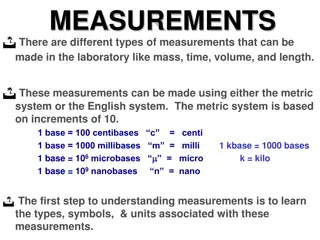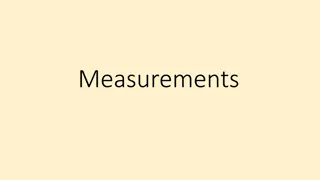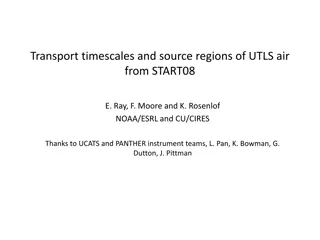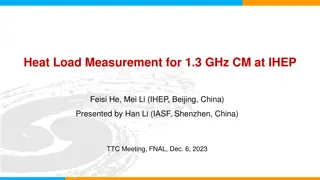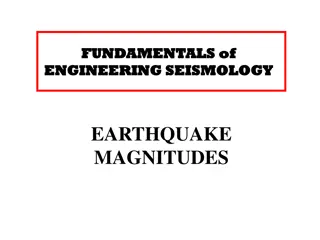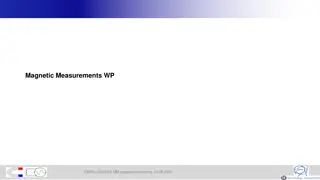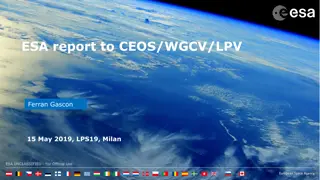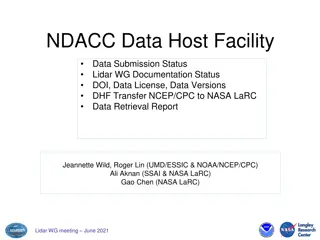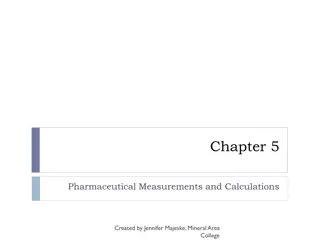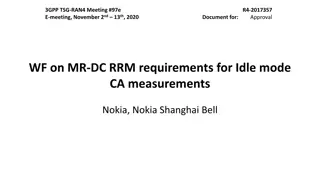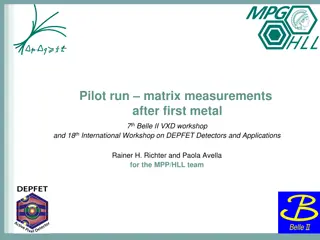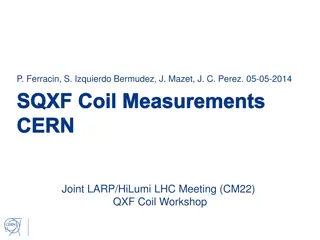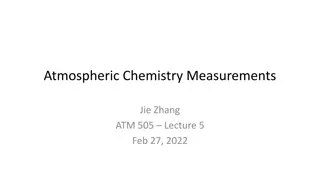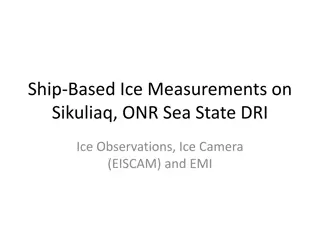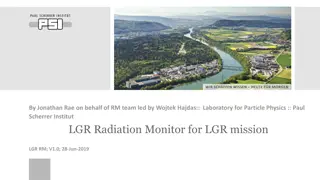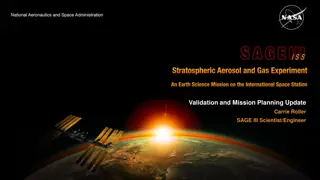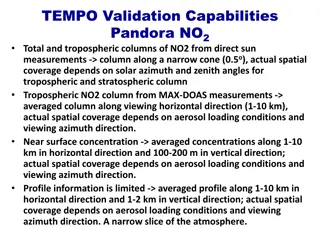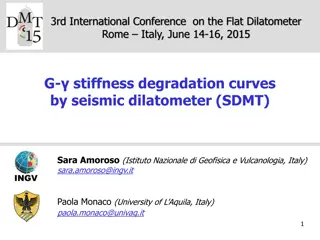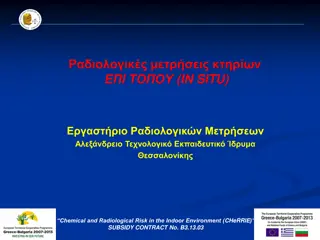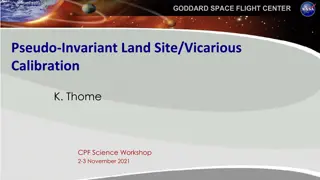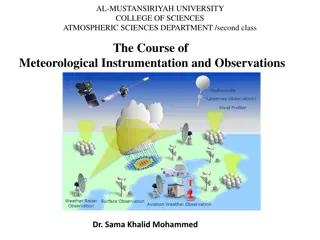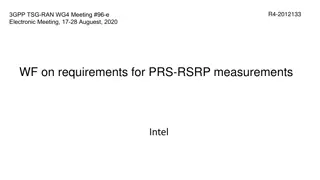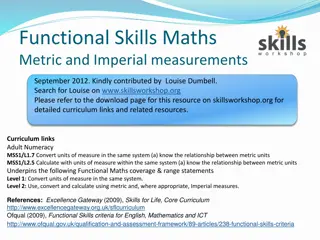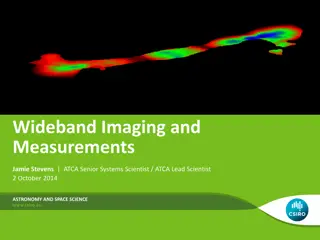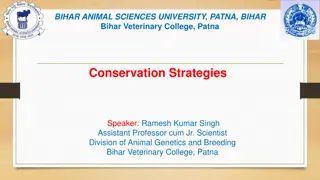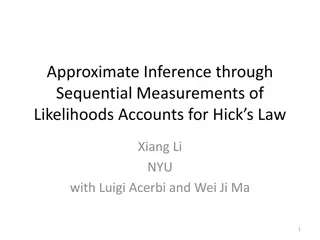Physics 2BL Laboratory: Measurements, Error Analysis & Data Interpretation
This Physics 2BL laboratory course focuses on measurements of physical quantities, error analysis, and interpretation of data. Students learn how scientists create models of natural phenomena and the practical aspects of conducting scientific experiments. Pre-requisites include Physics 2A, 4A or equ
0 views • 31 slides
Understanding Instrumentation and Process Control
This content discusses the importance of measurements in instrumentation and process control, outlining qualities of measurements, the main objectives of process instrumentation, applications of measurement systems, direct and indirect measurements, and functions of instruments such as transmitting,
1 views • 15 slides
Cardiac MR Measurements Guide
This guide provides detailed instructions and images on how to measure various parameters in cardiac MR imaging, including left ventricle measurements in diastole and systole, LA measurements, aorta measurements, and EF calculations using CVI42 software. It also includes steps for phase calculations
0 views • 8 slides
Estimation of Ionospheric Critical Plasma Frequencies Using GNSS Measurements
This research focuses on estimating the critical plasma frequency of the ionosphere, specifically the F2 layer (f0F2), using GNSS measurements. The study reviews past work on ionospheric modeling, discusses neural network training inputs, and presents a single station neural network model (NNT2F2).
0 views • 26 slides
Definition and Measurement Periods for RSTD in 3GPP TSG-RAN WG4 Meeting
In this document from the 3GPP TSG-RAN WG4 Meeting, the definition of intra/inter-frequency measurements, scenarios for RAN4 requirements, and measurement periods for RSTD are discussed. The focus is on requirements for RSTD and UE Rx-Tx time difference measurements. Various options and factors are
0 views • 19 slides
Importance of Measurements in Society
Measurements play a crucial role in society's proper functioning, involving units like ounces, pounds, inches, and cups for accuracy. Customary and metric systems are compared for distance, area, volume, weight, and temperature. Measuring equipment like liquid measuring cups ensures precise measurem
0 views • 24 slides
Monitoring Faroe Current Transport with Satellite Altimetry and In-situ Observations
Combining satellite altimetry and in-situ observations offers a comprehensive approach to monitoring volume, heat, and salt transports in the Faroe Current. The study focuses on the representativeness of ocean observations in the Arctic and Subarctic regions, highlighting the importance of combining
0 views • 11 slides
Neutrino Interactions with Liquid Argon at DUNE Near Detector Complex
The Deep Underground Neutrino Experiment (DUNE) aims to study neutrino oscillations using high-precision measurements with detectors like the Near Detector complex located downstream of the neutrino beam. Components such as ND-LAr and SAND play crucial roles in scanning energy spectra. SAND, a perma
0 views • 16 slides
Understanding the Importance of Soil and Groundwater Measurements
Explore the significance of infiltration and hydraulic conductivity measurements in environmental studies, training sessions offered by Eijkelkamp Training & Consultancy, and various reasons for conducting measurements such as defining drain distance, disconnecting rainwater, soil and groundwater po
0 views • 55 slides
Importance of Measurements in Society
Measurements play a crucial role in society's functioning, from customary systems to the metric system, ensuring accuracy in areas like distance, weight, volume, and temperature. Learn about essential terminologies, tools like liquid measuring cups, and the significance of accurate measurements for
0 views • 24 slides
Safely Logging Password-Derived Measurements for Web Login Systems
Design a secure measurement framework called Gossamer to assess risks associated with password-based measurements for web login systems. Explore ways to differentiate between benign and malicious traffic, and consider adding instrumentation to enhance security. Learn how attackers exploit password-d
0 views • 12 slides
Challenges in Hurricane Wind Speed Calibration and Validation Metrics
Need for accurate extreme wind measurements is crucial for various applications like hurricane tracking, climate monitoring, and oceanography. This includes reliance on dropsondes for wind speed calibration, validation metrics using multiple methods, and challenges in integrating different sources o
0 views • 22 slides
Understanding Laboratory Measurements: Types, Units, and Symbols
Different types of measurements such as mass, time, volume, and length can be made in the laboratory using the metric or English system. Learn about the units, symbols, and instruments associated with these measurements for length, mass, volume, temperature, time, heat, and pressure. Explore how to
0 views • 15 slides
Fundamentals of Physical Measurements
Science and engineering rely on measurements to understand natural phenomena. Physics aims to predict future outcomes based on observed data and fundamental laws. Base physical quantities like length, time, and mass have standard units, forming the foundation for deriving other physical quantities.
0 views • 13 slides
Novel Clean Assembly Techniques and In-Situ Mitigation Processes at TTC2023 Fermilab
Explore innovative clean assembly techniques, in-situ mitigation strategies, and recovery processes at the TTC2023 Fermilab event, focusing on preventing dust particle contaminations, maintaining on-line performance, understanding field emissions, and mitigating contaminations in cavities and cryomo
0 views • 4 slides
Understanding Transport Timescales and Source Regions of UTLS Air
Complex mixtures of air in the Upper Troposphere and Lower Stratosphere (UTLS) are studied using in situ trace gas measurements from the START08 campaign and surface stations. This research aims to determine transport timescales and source regions of air in the extratropical UTLS, focusing on high a
0 views • 11 slides
Cryogenic Heat Load Measurement and Calibration at IHEP
Researchers at IHEP in Beijing, China, conducted heat load measurements for a 1.3 GHz Cryomodule, analyzing uncertainties in flow rate readings and calibrating mass flow rates. The study involved static and dynamic heat load measurements, utilizing various control interfaces and valves. Calibrations
0 views • 9 slides
Understanding Earthquake Magnitudes and Seismic Measurements
Delve into the fundamentals of engineering seismology and earthquake magnitudes, exploring topics such as fault dimensions, slip distribution, spectral shapes, Richter's observations, and logarithmic scales. Gain insights into how seismic measurements are characterized and understand the significanc
0 views • 69 slides
Magnetic Measurements and Dipoles: Preparation Meeting Overview
In the preparation meeting for Magnetic Measurements at CERN, GSI, and CEA, various aspects of dipoles and measurement systems were discussed. Topics included instrument configuration, cycling requirements, accuracy considerations, and practical aspects such as reproducibility. The meeting outlined
0 views • 18 slides
ESA Validation Approach & Fiducial Reference Measurements Overview
The validation approach outlined by ESA focuses on providing reliable products with documented error bars and enhancing algorithm and sensor quality. A validation program consists of various activities, including validation against precise reference measurements, in-situ validation, inter-satellite
0 views • 8 slides
Lidar Working Group Data Submission Status - Continuing Measurements Report
The Lidar Working Group conducted a data submission status report on continuing measurements, including information on various sites, principal investigators, last archive comments, and data update statuses. The report covers a range of locations and parameters, highlighting the status of measuremen
0 views • 21 slides
Pharmaceutical Measurements and Calculations in Pharmacy
Understanding pharmaceutical measurements and calculations is crucial for pharmacy technicians to prevent calculation mistakes with serious consequences. This article covers the systems of measurement used in pharmacy, including the Metric System, basic math fundamentals necessary for pharmacy work,
0 views • 40 slides
3GPP TSG-RAN4 Meeting #97e Summary
During the 3GPP TSG-RAN4 Meeting #97e, discussions on Multi-RAT Dual Connectivity and Carrier Aggregation enhancements were held. A Work Item (WF) focusing on Idle mode Carrier Aggregation (CA) measurement Radio Resource Management (RRM) requirements was addressed. The meeting included topics such a
0 views • 17 slides
Matrix Measurements and Analysis After First Metal Workshop
The pilot run matrix measurements were conducted following the 7th Belle II VXD workshop and the 18th International Workshop on DEPFET Detectors and Applications by Rainer H. Richter and Paola Avella for the MPP/HLL team. The measurements included assessing defects, diode integrity, metal shorts, an
0 views • 30 slides
Coil Measurements and Monitoring at CERN: Insights and Procedures
This document provides detailed information about the coil measurements and monitoring process conducted at CERN, focusing on the SQXF coil. It includes data on coil winding, mandrel angles, edge locations, accumulated errors, and packing after curing. The text also discusses electrical quality assu
0 views • 9 slides
Understanding Atmospheric Chemistry Measurements and Methods
Explore the various types of atmospheric chemistry measurements, including research vs. monitoring, gas phase species, satellite vs. in situ observations, and spectroscopy and chromatography methods. Discover how researchers and regulatory bodies use different techniques to study and monitor air qua
0 views • 34 slides
Comprehensive Ship-Based Ice Measurements and Observations on Sikuliaq for Sea State DRI
This collection of images showcases various ship-based ice measurements and observations conducted on the research vessel Sikuliaq for Sea State DRI. The images include aspects such as sea ice observations, snow and ice thickness measurements, evaluation of orthorectification, and new snow and ice i
0 views • 8 slides
Advances in Radiation Monitoring Technology for Space Missions
Cutting-edge radiation monitoring technology developed by Jonathan Rae and the team at the Laboratory for Particle Physics, Paul Scherrer Institut, aims to provide in-situ measurements of protons, electrons, and ions for space missions. The LGR Radiation Monitor (RM) features improved detection tech
0 views • 8 slides
SAGE III Validation Update: Mission Planning, Partnerships, and Criteria
Carrie Roller, the SAGE III Scientist/Engineer, provides an update on validation and mission planning, including partnerships with NDACC lidar and sonde sites, weekly coordination of SAGE III events with in-situ data, and the criteria for validation using in-situ data such as stratospheric ozone, ae
0 views • 13 slides
Pandora Advanced Validation Capabilities for NO2 Monitoring
Pandora advanced validation capabilities for NO2 monitoring involve measurement techniques such as Total and Tropospheric columns of NO2 through direct sun and MAX-DOAS methods, with emphasis on spatial coverage dependent on various factors. The system provides real-time near-surface concentrations,
0 views • 6 slides
Insights into Soil Stiffness Degradation Using Seismic Dilatometer Data
This content discusses the analysis of soil stiffness degradation curves using data collected from the Flat Dilatometer and Seismic Dilatometer tests. Researchers Sara Amoroso and Paola Monaco present methods for deriving in situ G- decay curves and evaluating shear strain data in various soil types
0 views • 18 slides
Indoor Chemical and Radiological Risk Monitoring Study
The (IN.SITU) Chemical and Radiological Risk in the Indoor Environment (CHeRRIE) study conducted measurements of radon concentrations and e-perm levels in indoor environments from Oct. 2014 to March 2015. The findings show variations in radon and e-perm levels at different times of the day and acros
0 views • 14 slides
Radiometric Calibration Methods for Remote Sensing Applications
Techniques for radiometric calibration in remote sensing include vicarious approaches utilizing invariant desert sites, in-situ methods characterizing surfaces and atmospheres, and SI-traceable measurements for intercomparisons between sensors. The repeatability of in-situ results and comparison wit
0 views • 20 slides
Radiosonde Technology and Upper Atmosphere Measurements in Meteorology
Upper atmosphere measurements above the surface are crucial for forecasting and research in meteorology. Radiosondes, carried by balloons, provide data on pressure, temperature, humidity, wind speed, and direction. These measurements are vital for analyses and research, especially in emergency situa
0 views • 19 slides
Requirements for PRS RSRP Measurements in 3GPP TSG-RAN-WG4 Meeting #96-e
The presentation discusses the measurement requirements for Position Reference Signal Received Signal Strength Indicator (PRS RSRP) in 3GPP TSG-RAN-WG4 Meeting #96-e, focusing on measurement periods, capabilities, side conditions for Downlink Angle of Departure (DL-AoD), and accuracy requirements fo
0 views • 6 slides
Understanding Metric and Imperial Measurements in Maths
Explore the world of metric and imperial measurements in mathematics, covering units for length, mass, and capacity. Learn conversion rates and relationships between different units, enhancing your functional maths skills at levels 1 and 2. Discover the significance of milli-, centi-, and kilo- pref
0 views • 11 slides
Wideband Imaging and Measurements in Astronomy
Wideband imaging and measurements play a crucial role in astronomy and space science. This involves utilizing wide bandwidths to make accurate measurements and create images for continuum mapping and spectral-line observations. Increasing bandwidth enables lower thermal noise levels, quicker identif
0 views • 32 slides
Conservation Strategies in Animal Sciences at Bihar Veterinary College
Principles of conservation in animal genetics and breeding involve maintaining optimum population size, preserving unique traits, and selecting diverse stock. Methods include in-situ and ex-situ conservation, with in-situ conservation being preferred for its genetic variability and adaptability bene
0 views • 21 slides
Sequential Approximate Inference with Limited Resolution Measurements
Delve into the world of sequential approximate inference through sequential measurements of likelihoods, accounting for Hick's Law. Explore optimal inference strategies implemented by Bayes rule and tackle the challenges of limited resolution measurements. Discover the central question of refining a
0 views • 29 slides
Understanding Biodiversity Conservation and Its Importance
Exploring the concept of biodiversity conservation supported by the National Science Foundation, this work delves into the impacts of human activities on biological diversity, compares current extinction rates with past events, evaluates species conservation priorities, and distinguishes between ex
0 views • 16 slides
